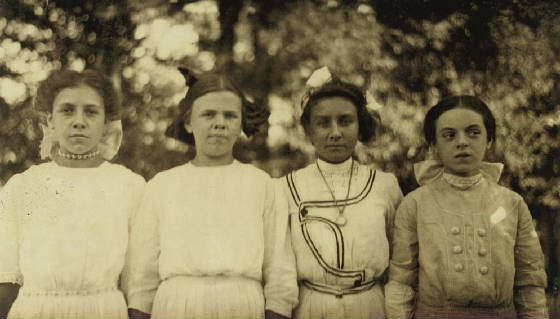
Lewis Hine caption: Comparison of Ages: Left end, Marion Deschere, just passed 13 years. Helps sister in mill “some.” Next is Mildred Greenwood, “going on 14.” Goes to school. Next is Mamie La Barge, 13 years, but said 14 years. Right end is Rosina Goyette, said 14, probably 12 or 13. Mamie and Rosina have steady jobs. Location: Winchendon, Massachusetts, September 1911.
Lewis Hine took three photographs of Rosina Goyette on Sunday, September 3, 1911. She was apparently dressed for Mass at St. Mary’s Catholic Church. The photos were among 40 he took in Winchendon over a three-day period. Since the Massachusetts child labor laws limited work in the mills to children 14 or older, Hine was trying to document violations. In all of his captions for Rosina’s photos, he noted that she looked younger than her stated age of 14. Hine was wrong in this case, as my research would reveal.
She was born in Winchendon on March 27, 1897, to Frederick and Ozine (Archambault) Goyette. Frederick was 17 years old, living in Winchendon, and working in a cotton mill in 1880, according to the census. He was born in Quebec about 1862. He married Ozine a year later. In 1900, Rosina was the youngest of seven children. She would be followed by three more siblings. In 1910, they lived on Glenallan Street, a common address for workers at the Springs Mill and the Glenallan Mill, which were within a mile of each other on that street.
Rosina married Joseph Gagnon on June 6, 1921, probably in Chicopee, Massachusetts, where they would live most of the rest of their lives. Joseph was born in New Hartford, Connecticut, on September 12, 1893. They had one child, Donald, who was born in 1939. Rosina’s mother died on April 17, 1930, at the age of 69; and her father died on June 4, 1940, at the age of 77. Her husband Joseph died in Chicopee in 1976, and son Donald died in 2006. Rosina Goyette Gagnon lived to be 98 years old. She died in California on May 27, 1995.
I obtained her obituary from the Springfield Union-News (Massachusetts), and that led me to her granddaughter, Gerri Gagnon, and Gerri’s mother, Janice Brids, who was the first wife of Rosina’s son Donald. They live in the Springfield area. My interview with them follows. All photos below provided by Goyette family, except those noted.
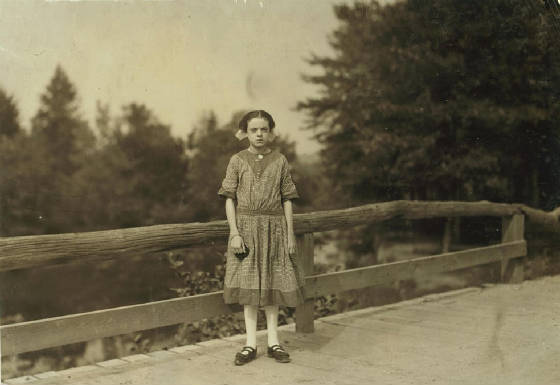
Lewis Hine caption: Rosina Goyette, Maple St. Apparently 12 but says she is 14; has steady job doffi[ng] and spinning in Spring Village Mill. She said at first she had been working six months, later she changed it to three weeks. Her partner said, “a few weeks.” Location: Winchendon, Massachusetts, September 1911.
Edited interview with Janice Brids, first wife of Rose’s son Donald Gagnon; and Gerri Gagnon, granddaughter of Rose and daughter of Donald and Janice. Interview conducted by Joe Manning (JM), on March 7, 2009.
Janice: I was born in 1940. I married Donald Gagnon in 1960. I had just graduated from a nursing program, and he had just graduated from American International College. We had been going together for about three years, so I had known Rose since about 1957. She and her husband had just moved from Wildemere Street, in Chicopee, where they had owned a house, to a rental on Ames Ave. in Chicopee. They had just sold the house.
JM: Why did they move?
Janice: I think it was just too much upkeep. It was a two-family house, the typical two-story tenement that factory workers lived in.
JM: Was Rose working then?
Janice: No. She had worked at Monsanto and Fisk Tire Company, both in Chicopee. But she stopped working when her son – my husband – was born in 1939. I think she was 42 then. He was her only child. I remember her telling me stories of how all these years she had been trying to have a baby, and then all of a sudden she was pregnant.
Gerri: Some quack doctor had first diagnosed it as a tumor.
JM: Janice, where was Rose’s husband working when you first got married?
Janice: He worked at the United Rubber Company in Chicopee.
JM: At that time, what were your impressions of your soon-to-be mother-in-law?
Janice: She was a very sprightly lady. She was very small, and she was getting to be a little bit round, as most of us do. She didn’t have much education. I don’t know how far she had got in school.
Gerri: She finished the eighth grade.
Janice: She was very busy all the time, moving all the time. She was not one to sit there and just do nothing. She was one of those housekeepers where everything had to be perfect. I remember that after I got married, I was a nurse and I had a child right away. I was pretty busy. I didn’t iron dish towels and stuff like that, and I thought she must have wondered what kind of a wife I was making for her son. But she was very good to me. They didn’t have much money. They were just factory workers. She used to make over dresses. She was very good at designing things. She’d get old dresses and redesign them, sew on frills, add collars and pockets and buttons, and so on.
JM: Did you know that she had grown up in Winchendon?
Janice: Oh, yes.
JM: Did she ever talk about that?
Janice: Not much. She said she came from a large family. Because she had my husband late in life, much of her family had died off by then. She had a sister in Gardner that she would go visit. Her name was Della. She worked in the furniture factories. Then Della died of cancer.
JM: Did she speak French?
Janice: Yes, but not to me.
JM: Would she sometimes speak to your husband in French, and you wondered what they were talking about?
Janice: Absolutely.
JM: Did you and your husband live all of your married life in Chicopee?
Janice: No. He went into the service quite soon after we were married. He was going to the University of Massachusetts for his master’s, and we were living in Northampton. I was working at the state hospital. Then Gerri was born.
Gerri: I was a honeymoon baby. They got married August 20, and I was born May 18.
JM: How long did you live in Northampton?
Janice: Just until Gerri was born. Then we moved to Three Rivers (part of Palmer, Mass), because my parents owned a two-family house there and had an apartment available. So my mother was right next door, and she could babysit while I worked at the state hospital in Monson.
JM: How was your husband able to afford college?
Janice: His parents paid for it. They had both worked until he was born, and they had only one child, so they must have been able to save some money. Then my husband joined the Air Force and became an officer. We were stationed in Texas, and then we went to Japan, where my second child, Donald, was born. We returned to the States the following year, because my husband was sent to Vietnam during the Tet Offensive. He worked in intelligence. A year later, we returned to Japan and stayed there for three more years.
JM: That would have made it hard to see your husband’s parents very often.
Janice: Well, they actually came to Japan once when we were there the second time. Rose was in her seventies then.
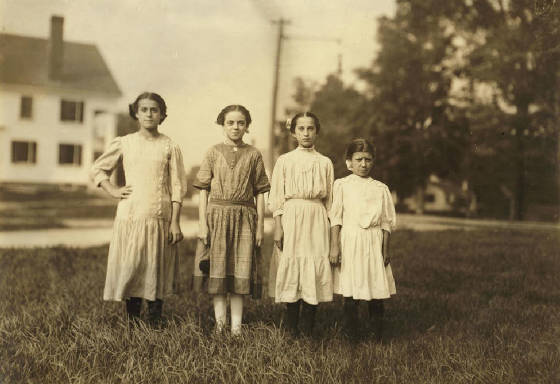
Lewis Hine caption: Comparison of ages: On right end is Mary Deschene, admitted 11 years, helped sister spool all summer in Glenallen Mill. Next her is Lumina Demarais, admitted 12 years, and doffing all summer in Spring Village Mill. Next is Rosina Coyette, said she was 14 but Mr. Hine doubted it; has steady job doffing and spinning in Spring Village Mill. Left end is Eva Caonette, spinner in Spring Village Mall, said she was 14 but may not be. Location: Winchendon, Massachusetts, September 1911.
JM: So Gerri, you were born in 1961. What did you remember about your grandmother when you were growing up?
Gerri: My mother was boney, but my meme (French for grandmother) was soft. I remember falling asleep in her lap while she watched television. She would watch Red Skelton and all those old shows. She always had a big jar of peppermints for me. Her house was sort of Victorian. The curtains had tassels, and she had lots of knickknacks around, which were always dusted. She crocheted gorgeous things, like tablecloths and bedspreads and doilies. The house she was in then was right across the street from the fire station. I used to love to run to the window and watch the fire trucks when there was an alarm. She had an old ringer washing machine, and I used to like to watch her do the wash.
She was a great cook. She believed everything had to be slow cooked, at least 10 hours. So she would get up at 4:00 in the morning to make dinner for 6:00 in the evening. It would be cooking all day. My grandfather, my pepe, had been gassed in World War One, and he couldn’t eat anything but soup, even during Thanksgiving. We got the old French cooking, and poor Pepe only got soup.
Meme was very outgoing, always smiling, talking a mile a minute, sometimes in French. It’s funny. She would serve orange juice warm. She always warmed it up, and I never knew why. She belonged to the Golden Agers and the American Legion. She went on lots of local trips. They also went to the World’s Fair in Montreal. She was deaf in one ear. She said that when she was a child, they tried to cure it by blowing smoke in the ear.
Janice: She had mastoiditis.
JM: When you became a teenager, did your relationship with her change?
Gerri: No. That was when we came back from Japan. My mother and I came back first, and then my father came back and was stationed in California. We stayed here. At that point, my mother and father were divorced. But even after they were divorced, my mother made sure I still had a relationship with my meme and pepe. So I would still spend Sundays with them almost every week.
When my grandfather died (September 1976), my father came back from California and took Meme back with him. They drove across the country, which must have been a very interesting trip. She was very self-sufficient and had all her marbles until she was 96 years old. Then she got sick. She had a scratch that got infected. She ended up going to the emergency room, and they said she was getting senile. They just filled her with antibiotics, and that can mess up your mind. She lost a lot of weight.
She was admitted to the hospital, and after a few days, they put her in a nursing home. She hated it. She kept saying, ‘Get me out of here.’ I was attending the University of Southern California at the time. They wouldn’t let her out until her weight was back up. But she was so depressed, that she wouldn’t eat, and she got down to 70 pounds. She finally gained some weight and they let her out. Then she broke her hip. They did a hip replacement, a full hip replacement when she was 98 years old. And that’s what finally killed her.
JM: When did you graduate from high school?
Gerri: 1979.
JM: And what did you do then?
Gerri: I went straight to USC.
JM: What were you planning to study?
Gerri: I double-majored in cinema-TV production and medieval-renaissance history. My father had gone to USC to get his master’s and doctorate in public administration. I was accepted to all the colleges I applied to, including three Ivy-League schools, but USC was the only school where I could have the double major I wanted. I graduated in 1983. I did an internship at WGBY (Public TV station in Springfield, Mass). After that, I worked at various TV stations all over the country. I make documentary films now.
JM: Where were you when your grandmother died?
Gerri: Here in Massachusetts. I picked up my father at the airport. Meme was cremated, and he brought back the ashes. She’s at St. Patrick’s Cemetery in Chicopee, where my father is also buried. I visit the graves three times year.
JM: What did you think when I sent you her photo from 1911?
Gerri: I recognized her immediately.
JM: Were you surprised to see your grandmother photographed as a child laborer?
Gerri: No. We all knew she worked in a mill then. But I was surprised that she was one of the children that Lewis Hine photographed. I knew about him from doing some research on a documentary. I was amazed, because I was always looking through the local history books in Chicopee to see if there were any photos of my grandmother.
JM: The birth records in Winchendon show that your grandmother’s name was Rosina. Lewis Hine gave her that name in the caption.
Gerri: The only person who ever called her Rosina was my father, when he was teasing her. Otherwise, it was Rose.
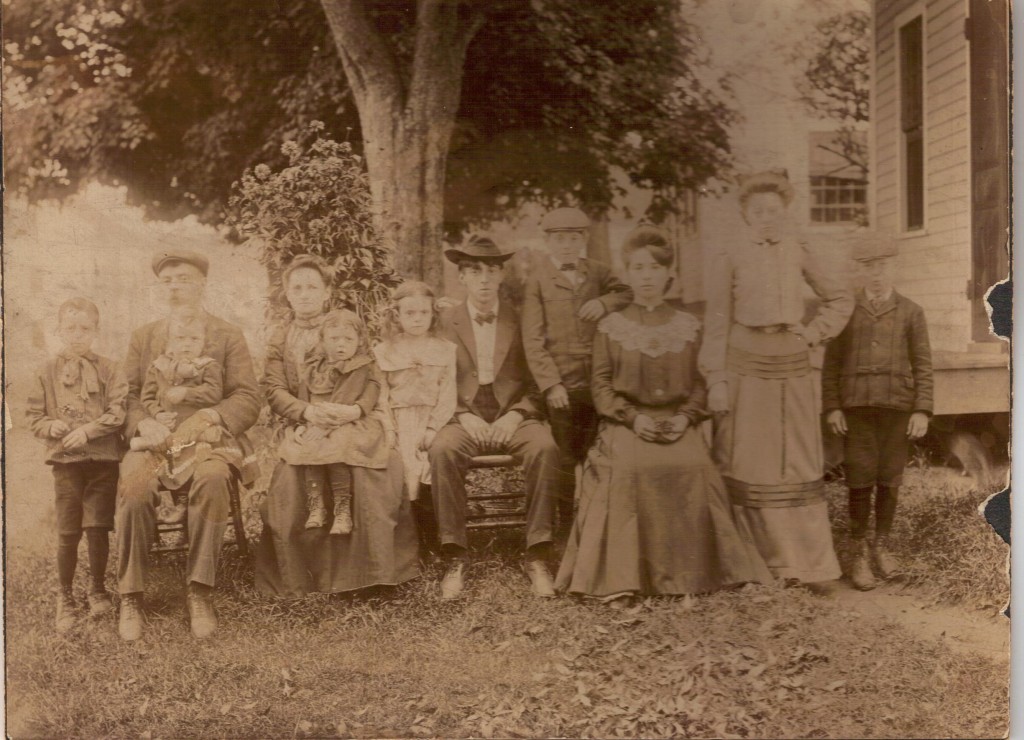
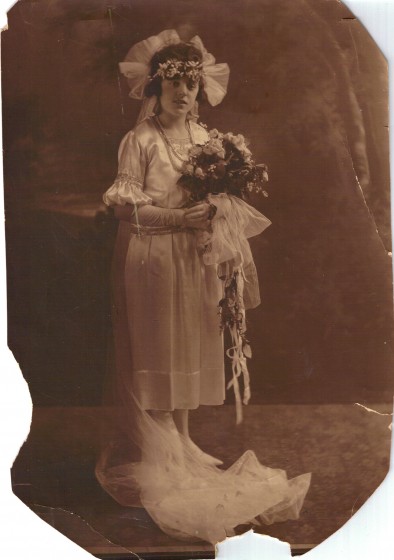
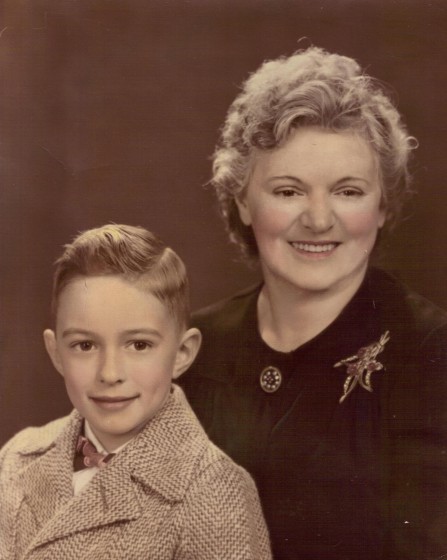
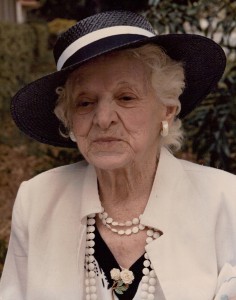
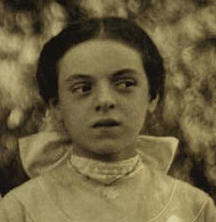
Rosina Goyette Gagnon, 1897 – 1995
*Story published in 2009.